|
|
||||
| Degré
Zero+Carbone+Ray(BRS architectes) ASC Project - Sarajevo Concert Hall Competition 1999 Finalist and Honorable Mention (2nd prize) |
||||
[en français] |
"We know that the membrane of the tympanum, a thin and transparent partition separating the auditory canal form the middle ear (the cavity), is stretched obliquely (loxôs) from above to below, from outside to inside, and from the back to the front. Therefore it is not perpendicular to the axis of the canal. One of the effects of this obliqueness is to increase the surface of impression and hence the capacity of vibration" J. Derrida |
|||
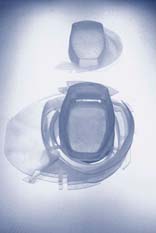 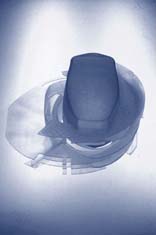 Stereolitographic model of Surfaces. |
It is imperative, here, to prolong an alteration, the luxury of a
surface that is not just a surface of harmonic reverberation, but rather the imprint of
movement, the progression of a wave that indifferently affects all surfaces. The notion we
are hoping to spread throughout the project is not that there are no hard lines at the
limit. Rupturing the limit means curving it, carving a volute in continuity between inside
and outside. It is the supposition of linear anamorphism. The ASC-project is therefore
less an apology for complexity than a critique of a certain panographic
architecture, that is to say, already exhausted by its planar right angle representation.
It doesn't downplay comprehension, it makes the senses vibrate in curved trajectories.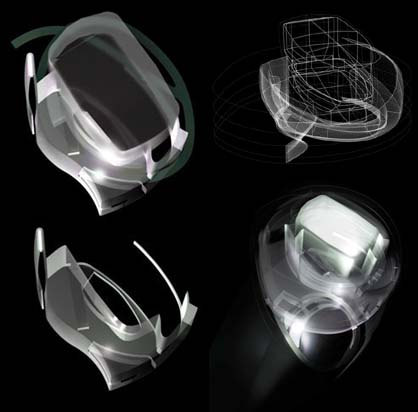 Diagram study and study of surfaces wraped around the main Hall. Our exploration is based upon the diverse experiences which have lead man to study the relationship between sound, the visual, and the corporal. The trance obtained during the rhythmic seances by the shamans is comparable to that of the simple pleasure of music lovers, the closing of eyes and leaving oneself to be carried by the whirlpool of a symphony. The shaman rites are not reduced to the unbalancing of the body, it is the participant's environment which finds itself twisted, creating a situation in which one doubts one's capacity to elaborate a stable and permanent construction of space. |
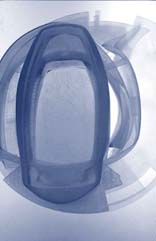 Stereolitographic model of Surfaces. |
||
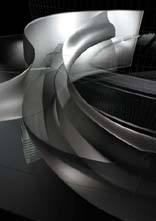 Geometry of Surfaces. |
Open assembly of receptive surfaces: it is by geological
continuity that the building integrates itself in the site, a preliminary topographical
alteration that allows public service spaces to slide from underneath (lower lobby access,
cafeteria and library) to above (the restaurant) of the natural ground level. The double
façade in etched glass is conceived as a filter, a superposition of two grids of
horizontal lines that mask and blur the complex relations of the interior surfaces,
ephemeralizing them. This spectral logic is reinforced by the architectural definition
itself of these elements. The translucent resin surfaces, lighted from the interior, flow
from the ramps to the wall, all up to the inner decorative panelling in the concert halls,
creating surface tension and hierarchical contradictions. Never is a spatial limit whether
between the performance hall and the ramps, or the ramps and the foyers-a simple limit. It
doubles over itself, twisting, to become the space itself that is then limited, subtly,
fading with light. In this way, continuities flow in inflection between the (decorative?)
covering of the performance hall and the outer layer of ramps, from ceiling to floor. The
stage layout of each auditorium responds to this proceeding, searching for the fluidity of
balcony circulation (in the main performance hall) or that of the acoustical disposition:
the plaster panels that enclose each of the auditoriums pleat themselves, forming curious
surfaces, reproducing the motif of amplification and transformation that is found in the
altered ground surface. |
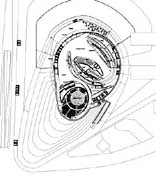 Entrance Level (plan). 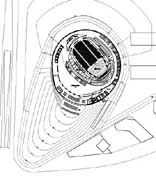 Foyer Level (plan). |
||
| The form of a thing is always its trans-formation. It is
this movement, the specular equivalent of a blinding light, that imprints, or
impresses (in the photological sense) the project. Although it communicates via an optical
logic, it is for the benefit of disrupting, and denoting, in a hollow, the unbalance of
things. The forging nature of the circulation, the alterations between the grounds and
building's envelope, do not strive for their just and rectified forms, but rather mark the
trace of a decelerated adjustment to the spatial quality that downplays all unequivocal
apprehension. Spatial separation and unalignement. A Libre-Jeu of un-limitations
that suspend for an instant the weight of measure. The space of the blink of an eye. Degré Zero+Carbone+Ray(BRS architectes) |
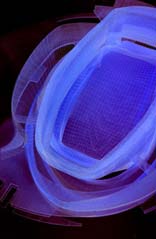 Geometry of Surfaces. |
|||
|
||||
laboratorio
|
||||